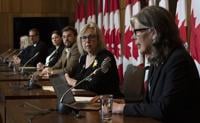OTTAWA - Reforms in the federal budget bill that seek to clarify Canada's sanctions regime will actually have the opposite effect, warn The ¥∫…´÷±≤• Bar Association and a lawyer helping firms navigate the rules.
"From the perspective of assisting ¥∫…´÷±≤• businesses doing business with Russia ‚Ķ the legislation is flawed, in that it is incomplete and lacks clarity," saidWilliam Pellerin, an Ottawa-based trade lawyer with the firm McMillan LLP.
The Liberals are proposing changes that would specify which entities are barred from doing business with ¥∫…´÷±≤•s, such as companies that are 50 per cent or more owned by someone whom Ottawa has sanctioned.
While thatchange puts Canada in line with its allies, Pellerin argued many of theother proposals are too vague.
"Maybe the government's intention here is to make the legislation unworkable for ¥∫…´÷±≤• businesses. And if that's the case, then they're accomplishing their objective," he said in an interview.
"If, on the other hand, the purpose of the legislation is to provide clarity and ensure that ¥∫…´÷±≤• businesses are competitive with their U.S. and EU counterparts, then the legislation fails."
Pellerin noted that another part of the bill targets foreigners who can direct a company's activities "directly or indirectly, and through any means," which he said will be too difficult for companies to track.
The legislation also doesn't seem to clarify if an entity is barred when its ownership involves more than one sanctioned person who together pass the threshold of 50 per cent ownership, he said.
In a brief to the House finance committee, the ¥∫…´÷±≤• Bar Association said the current phrasing is "highly subjective and may lead to inconsistent outcomes."
For example, if a sanctioned person has the ability to vote on the composition of a corporation's board, or can appoint just one of 12 board members, that would likely bar the company from commerce with ¥∫…´÷±≤•s under the proposed amendments.
Pellerin noted that Britain's legislation is more constrained, such that a company would only be affected if a sanctioned person holds 50 per cent of a corporation's voting rights or the ability to control a majority of a corporation's board appointments.
The new rules "would create more uncertainty and penalize ¥∫…´÷±≤• entities seeking to comply" with rules that aren't as clear as those in other countries, the bar association said.
"The amendments … do not increase the predictability and certainty of Canada's sanction regime. Rather, they cause further confusion and compliance challenges," its brief said, adding it demanded clarity long before the Liberals tabled their budget in late March.
"To date, no guidance has been issued by Global Affairs Canada despite repeated and long-standing requests from the (association), trade lawyers and the business community," read the brief.
In a Friday statement, the department said it is "closely reviewing" the points raised by both Pellerin and the CBA.
"The government of Canada is committed to mitigating the impacts of Canada's sanctions legislation on Canada's business community and supporting effective implementation of sanctions," wrote spokesman Grantly Franklin.
He added that the proposed changes "aim to clarify certain provisions, make processes more efficient, increase information-sharing and tighten Canada’s sanctions regime."
Pellerin assists companies navigate ¥∫…´÷±≤• sanctions, particularly involving Russia. At times, that includes global mining or energy corporations that have worked for years in both countries, given their similar terrain.
Other clients are finding it hard to do business even with companies that sit far away from Russia, he said, such as in Gulf states. They might only learn those companies are partly owned by a Russian oligarch when a transaction gets blocked.
"No one wants to see Russia succeed with its further invasion of Ukraine. I think that's a key point here," he stressed.
Less-contested changes in the bill involve making permanent the ongoing temporary withdrawal of Russia and Belarus from preferential tariffs, meaning goods from those countries would remain subject to a 35 per cent tariff.
The amendments would also clarify that an unused law to forfeit sanctioned assets can be used against all sanctioned people and not just those who are Russian citizens, and broaden the phrasing of sanctions law to include not just goods but property in general.
The bill would also allow Canada to sanction foreigners who are citizens of countries that Ottawa hasn't yet targeted for sanctions.
Currently, the government must undertake a regulatory process to add a country to the sanctions regime if any of its citizens are to be sanctioned. It has had to undertake that process in order to target Moldovans who have assisted Russia's war effort.
The amendment would allow Canada to list any non-¥∫…´÷±≤• without assessing an entire country. This means it could, for example, sanction an American who aided Moscow.
There has been a historic uptick in the number of individuals and corporations Ottawa has sanctioned recently in response to Russia's invasion of Ukraine, as well as to human-rights crackdowns in Iran and gang violence in Haiti.
This week, the Senate's foreign-affairs committee called on Ottawa to clarify the reasons it issues sanctions and improve the ways it assesses whether financial embargoes and travel bans are actually working.
The senators called for more transparency around the obligations of ¥∫…´÷±≤• businesses, how Ottawa chooses who to target and what people can do to appeal sanctions.
The senators noted that Canada provides less guidance than its allies on how companies are supposed to follow the rules, though some of the budget bill's measures would address that concern.
This report by ¥∫…´÷±≤•was first published May 19, 2023.








































